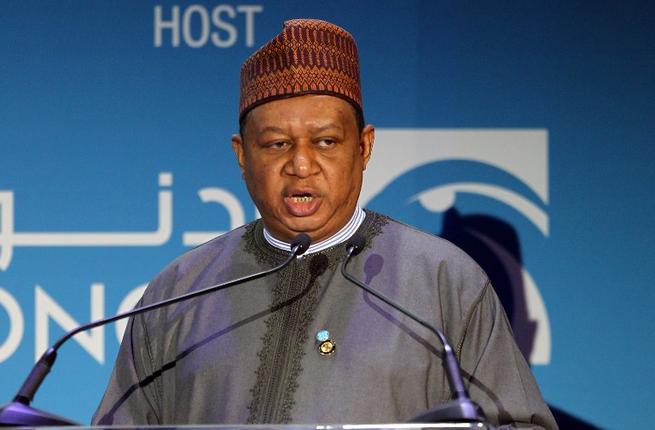
The Secretary-General, Organisation of Petroleum Exporting Countries (OPEC), Dr Mohammed Barkindo, says Nigeria has assumed a strong, proactive role in the oil industry globally.
Barkindo said this while delivering a keynote address at the 17th edition of the annual “Nigeria Oil and Gas Strategic Conference and International Exhibition’’ in Abuja on Tuesday.
“We can truly say that we are living through a golden era of Nigerian statesmanship. This is testimony to the way in which President Muhammadu Buhari has elevated the international profile of our country.
“Nigeria has historically assumed a strong, proactive leadership role in OPEC.
“I am delighted to be able to inform you that following a decision at the 174th OPEC conference on June 22, the African continent gained an additional voice in our organisation, the Republic of the Congo became the 15th member country of OPEC.
“This is a tremendous boost for our entire organisation, a positive trajectory which saw Gabon rejoin OPEC in 2016 and Equatorial Guinea in 2017.’’
The OPEC boss said petroleum would remain a rallying factor that brings units of people together to facilitate day to day activities.
“At this very moment as I speak, schoolchildren are boarding the bus to make their way to morning lessons. Mothers and fathers are returning home after working nightshifts.
“An elderly grandparent is being transported to see their doctor. Farmers are fertilizing their fields. Families are being reunited, communities are being brought together.
“These are scenes being repeated millions of times here and across the globe. What links these seemingly disparate scenes of everyday life? Petroleum.
“Indeed oil is so intrinsic in daily life that we sometimes overlook the fact that our industry has an impact on the individual experiences of billions of people,’’ he said.
Barkindo said although the industry was far from being perfect, actors in the sector could take pride in oil’s role in fueling modern civilisation, lifting millions out of poverty and contributing to sustainable development.
He said extreme volatility in the oil market had very negative consequences for both consumers and producers.
“Low oil prices are bad for producers today and create situations that are bad for consumers tomorrow, and high oil prices are bad for consumers today and lead to situations that are bad for producers tomorrow.
“Volatility is a devastating disincentive for investment, which is the lifeblood of our industry and essential for ensuring adequate supply in the future.
“We saw this during the last industry downturn. From 2014 to 2016, world oil supply growth outpaced that of oil demand, with world oil supply growing by 5.8 million barrel per day (mb/d), while world oil demand increased by 4.3 mb/d.
“By July 2016, commercial stock overhang reached a record high of about 403 mb over the five-year average. The OPEC Reference Basket price fell by an extraordinary 80 per cent between June 2014 and January 2016.
“What was particularly ominous for consumers was the fact that investments were choked-off, with exploration and production spending falling by an enormous 25 per cent in both 2015 and 2016.
“Additionally, nearly one trillion dollars in investments were frozen or discontinued, and many thousands of high quality jobs were lost.
“A record number of companies in our industry filed for bankruptcy. Lack of investment on this scale has very serious repercussions for future consumers, especially given the increase in world oil demand which is expected in the long term.’’
He said according to OPEC’s World Oil Outlook, long-term oil demand is expected to increase by 15 mb/d, rising from 94.5 mb/d in 2016 to 111.1 mb/d in 2040.
“To meet the projected increase in global oil demand, investments worth an estimated 10.5 trillion dollars will be required. Investment is also necessary to offset the impact of natural decline rates, which can be as high as five per cent per year.
“To maintain current production levels, the industry may need to add upward of 4mb/d each year. The situation was bleak, but as the saying goes, the darkest hour is that before the dawn.
“So began the most intensive negotiations in the history of the Organisation. Meetings lasted hours, days and nights.
“I witnessed displays of stamina in those sessions that I have never seen before in my life: including from our own Minister Kachikwu. Thankfully, all these labours were not in vain.
“With the landmark Declaration of Cooperation, 24 now 25 oil-producing nations agreed at the first OPEC and non-OPEC Ministerial Meeting, which held on Dec. 10, 2016 in Vienna on a concerted effort to accelerate the stabilisation of the global oil market through voluntary production adjustments of around 1.8 mb/d.
“The second OPEC, non-OPEC Ministerial Meeting held on May 25, 2017, extended the voluntary production adjustments for another nine months commencing on July 1, 2017.
“Following the third OPEC and non-OPEC Ministerial Meeting on Nov. 30, 2017, the Declaration of Cooperation was amended to take effect for the whole year of 2018.
“The 174th Meeting of the OPEC Conference and the 4th OPEC and non-OPEC Ministerial Meeting held on June 22 and 23 this year, reaffirmed the partners’ unshakeable resolve to act in the interests of producers and consumers.
“Participating Countries also agreed to strive to adhere to the overall conformity level of 100 per cent for the remainder of 2018,’’ he said.










